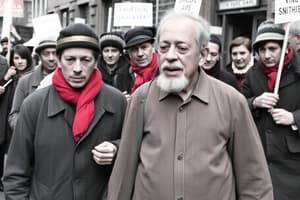Podcast
Questions and Answers
What do cultural studies scholars aim to do with dominant/hegemonic ideologies and messages in literary and media texts?
What do cultural studies scholars aim to do with dominant/hegemonic ideologies and messages in literary and media texts?
- Dismantle/deconstruct them (correct)
- Perpetuate them
- Create new ones
- Ignore them
Who developed the approach of deconstruction?
Who developed the approach of deconstruction?
- A literary critic
- Jacques Derrida (correct)
- A French philosopher
- A postcolonial scholar
What is the primary goal of deconstruction in postcolonial studies?
What is the primary goal of deconstruction in postcolonial studies?
- To create new binary oppositions
- To dismantle or demystify binary oppositions (correct)
- To analyze Western ideologies
- To reinforce colonial ideologies
What does deconstruction reveal about the meanings in cultural texts?
What does deconstruction reveal about the meanings in cultural texts?
What is the role of texts in relation to ideologies and hegemonic voices?
What is the role of texts in relation to ideologies and hegemonic voices?
What is the focus of deconstruction in literary criticism?
What is the focus of deconstruction in literary criticism?
What is the ultimate goal of deconstruction in postcolonial studies?
What is the ultimate goal of deconstruction in postcolonial studies?
What is the relationship between deconstruction and poststructuralism?
What is the relationship between deconstruction and poststructuralism?
What is the main objective of deconstruction in reading cultural texts?
What is the main objective of deconstruction in reading cultural texts?
What do postcolonial critics aim to do with the hegemonic voices in cultural texts?
What do postcolonial critics aim to do with the hegemonic voices in cultural texts?
Flashcards are hidden until you start studying
Study Notes
Cultural Studies: Concepts, Scholars, and Theories
Stuart Hall
- A West Indian-born British thinker and Director of the Birmingham Centre for Contemporary Cultural Studies from 1968 to 1979.
- Developed cultural studies, influenced by Antonio Gramsci's ideas on ideology and hegemony.
- Introduced poststructuralism in cultural studies.
- Theory of Encoding and Decoding: media messages and cultural texts are produced and consumed by audiences, where meaning depends on audience reception and interpretations.
Michel Foucault
- A philosopher who studied power and its operation in contemporary societies.
- Argued that knowledge is a form of power, and power is a function of knowledge.
- Power resides in culture and social institutions, controlling and disciplining individuals, which can lead to internalization of dominant beliefs and values.
- "Where there is power, there is resistance," paving the way for cultural studies, especially postcolonial theory.
Antonio Gramsci
- An Italian Marxist scholar who addressed the exercise of political power, working-class activity, and the commitment to Marxist tradition.
- Developed the concept of hegemony, a cornerstone of cultural studies, especially postcolonialism.
- Wrote about dominant groups and sought to give voice to the subaltern/working classes.
Gayatri Spivak
- An Indian literary and postcolonial feminist critic, member of the Subaltern Studies group.
- Considered herself a "practical Marxist-feminist-deconstructionist," affiliated with Marxism and Jacques Derrida's deconstruction approach.
- Explores marginalized voices silenced by Western/Eurocentric discourses, especially Third World women.
- Employs deconstruction to break down Western hegemonic narratives and empower subaltern voices.
Concepts and Theories
Discourse
- A written or spoken statement used in communication between people, mainly related to politics, ideology, policy-making, and power.
- In cultural studies, discourse is more than linguistic study of language, related to a system of power relations and dominant voices.
Hegemony
- Concept developed by Antonio Gramsci, referring to the power or dominance one social group exercises over others.
- Refers to the ways and practices used by those in power to maintain social control and disseminate dominant ideologies over the masses.
Deconstruction
- Developed by Jacques Derrida, a poststructuralist technique used in literary criticism and postcolonialism.
- A strategy of reading and interpreting cultural texts to determine and criticize discourses of subordination, power, and exclusion.
- Used to show that meanings in cultural texts are not stable or fixed and are full of conflicting meanings and interpretations.
Studying That Suits You
Use AI to generate personalized quizzes and flashcards to suit your learning preferences.




